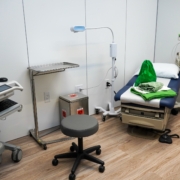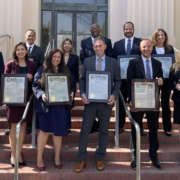San Diego County District Attorney Summer Stephan joined the County’s Board of Supervisors to honor 16 Deputy DAs for their outstanding work and commitment to public safety. Supervisor Terra Lawson-Remer declared Tuesday, August 16, 2022, “Prosecutors’ Day” in San Diego County and presented proclamations to each of the individuals being honored.
“This recognition by our Board of Supervisors of the excellence in ethical prosecution that these Deputy District Attorneys demonstrated is very meaningful to our entire team, and reinforces our commitment to pursuing fair and equal justice for all, protecting victims and keeping our neighborhoods safe,” said DA Summer Stephan.
The awardees selected by the Deputy District Attorneys Association, led by Association President Ben Barlow, are Lisa Weinreb, Jessica Coto, Dan Owens, Peter Quon, Flavio Nominati, Zach Wallace, Miriam Hemming, Leon Schorr, Karl Husoe, Scott Pirrello, Jill Lindbergh, Jennifer Reischl, Justine Santiago, Jared Coleman, David Grapilon and Damon Mosler.
There are currently 327 Deputy District Attorneys employed by the DA’s Office and the Office files more than 40,000 criminal cases each year.
The prosecutors were honored for their following contributions:
DDA Lisa Weinreb is the 2021 recipient of the San Diego Deputy District Attorneys Association’s Charles Nickel Award for Excellence in Training, Public Policy or Legal Education given to a prosecutor whose professional excellence and contributions have had significant local or statewide impact in the area of public policy, legislation, training, or education in the criminal justice arena. DDA Weinreb, as Chief of the Juvenile Division, helped create the Juvenile Diversion Initiative, a first of its kind program that provides San Diego County youth with expanded alternatives to charging, detention, and probation utilizing restorative justice principles allowing victims to have a role in repairing the hard done to them through offender accountability. The initiative aims to reduce incarceration of our community’s youth and provide the support necessary to move past youthful indiscretions and make a positive change for the individual and the community. DDA Weinreb worked directly with community support services to provide programs and rehabilitation rather than prosecution for youthful offenders through collaboration with the Juvenile Court, the Public Defender’s Office, the Probation Department, Behavioral Health Services, the Annie E. Casey Foundation, the Children’s Initiative, and the National Conflict Resolution Center. DDA Weinreb embodies what it means to be a modern prosecutor through her knowledge of the law, passion for victims’ rights and commitment to public safety, and her leadership ensured this coalition of support for the community’s youth would be successful.
DDA Damon Mosler (retired) is the 2021 recipient of the San Diego Deputy District Attorneys Association’s George “Woody” Clarke Award for Prosecutorial Excellence given to an outstanding prosecutor whose contributions in a particular subject matter area of the law promoted justice, fairness, and equality in the prosecution of cases with an important and sustaining impact on the legal community as a whole during the last year or over the course of an entire career. DDA Mosler rose through the ranks as a trial prosecutor on the Central prelim team, South Bay misdemeanor and felony trial teams, the Juvenile Division in the JUDGE (“Jurisdictions United for Drug & Gang Enforcement”) Unit, the Superior Court Division, and the South Bay JUDGE Unit. In 2003, DDA Mosler was selected to create an operational plan for a new Narcotics Division in order to combat the rising toll of damage caused by the narcotics epidemic and became its first Chief due to his relevant knowledge, reputation for integrity, and organizational skills. DDA Mosler was “present at the creation” demonstrating his expertise in the use of confidential informants, wiretaps, and asset forfeiture proceedings; trained prosecutors and law enforcement in-house, statewide, and nationally; and received numerous awards. DDA Mosler likewise served as Chief of the Special Operations and Chief of Economic Crimes and is widely recognized as a great manager, inspiring leader, strategic problem solver, and, most importantly, an ethical guidepost to many.
DDA Dan Owens and DDA Peter Quon are the 2020 recipients of the San Diego Deputy District Attorneys Association’s George “Woody” Clarke Award for Prosecutorial Excellence given to an outstanding prosecutor whose contributions in a particular subject matter area of the law promoted justice, fairness, and equality in the prosecution of cases with an important and sustaining impact on the legal community as a whole during the last year or over the course of an entire career. DDA Owens was the prosecutor assigned to the case of People v. Jeremiah Owens and Christopher White in which two men tried to abduct a 15-year-old girl in broad daylight outside a residence above Grandview Beach in Encinitas before she fought back and thwarted the sexual assault and attempted kidnapping. Given this brazen attempt, DDA Owens invoked a section of the California Constitution that allowed the court to find there was sufficient evidence that both defendants posed such a substantial danger to the community and the victim herself that they should be held in custody without bail and could not be released pending trial. DDA Owens laid the groundwork for the appellate victories to come by drafting and filing excellent motions, developing a persuasive evidentiary record for the court, and arguing aggressively. DDA Quon, an accomplished, brilliant appellate prosecutor with decades of experience as a Deputy Attorney General handling writs and appeals, joined DDA Owens on the case and the two prosecutors worked together over two years to ensure this novel constitutional issue of statewide importance became settled legal precedent. DDA Quon led the long odyssey of legal research and brief writing while strategizing with DDA Owens who prepared and delivered the oral arguments before the Fourth District Court of Appeals and, ultimately, the California Supreme Court. DDA Quon and other appellate gurus mooted DDA Owens numerous times throughout the journey to March 3, 2020, for the final arguments in the Supreme Court chamber. As a direct result of DDA Quon’s guidance and coaching, DDA Owens made the argument that resulted in a unanimous published opinion of In re White upholding the trial court’s no bail order and setting a clear roadmap for how courts statewide must carefully balance the interests of the accused with the rights of crime victims and public safety. Deputy DA Quon passed away recently and his family is gratified by this special acknowledgment. Peter was an icon in the legal community and left a legacy of mentoring generations of Asian lawyers.
DDA Flavio Nominati is the 2021 recipient of the San Diego Deputy District Attorneys Association Outstanding Achievement Award, 7 Years or Less in the Office. This past years, DDA Nominati obtained guilty verdicts and achieved justice for victims in three serious felony cases. In the trial of People v. Johnathan Eggers, the defendant was charged with Carjacking, Robbery, and Assault by Means Likely to Produce Great Bodily Injury. There, the defendant stealthily approached the victim from behind with his co-perpetrator who hit the victim in the head with a pistol while a co-defendant tased the victim. As the victim fell to the ground, unconscious, the defendant took his car keys and drove off in the victim’s car. DDA Nominati then tried a case of People v. Paige where the charges included kidnapping with intent to commit rape, attempted forcible rape, and assault with intent to commit rape. During the beginning of COVID-19 quarantine the Victim was walking back from work on the San Diego City College campus. The Defendant emerged from an alcove where he was hiding, grabbed her, and pulled her into an alcove which was off the walkway. Defendant continued striking her and tried to take off her pants. He kneed victim’s face and started sexually assaulted her. Fortunately, a janitor heard the victim’s screams and the defendant fled. Finally, in People v. Milton Rodgers the defendant fired a gun on several different instances in a residential area, across El Cajon Blvd, near downtown/Golden Hill area, at a residence (bullet was five feet away from the victim’s head while he watched TV inside his living room), and at another victim’s car as she drove through North Park. DDA Nominati secured guilty verdicts for each victim in these cases and as result each defendant is serving a significant prison sentence as a result of these violent acts crimes.
DDA Zach Wallace is the 2021 recipient of the San Diego Deputy District Attorneys Association Outstanding Achievement Award, 7 Years or Less in the Office. In his short time in the office, DDA Wallace has excelled in handling complex cases, including robbery, assault, carjacking, arson, human trafficking, and sexual assault cases. In People v. Rafo, Zach successfully tried a multi-victim sexual assault case in which the defendant preyed upon vulnerable and fragile victims. The defendant convinced his victims to get in his car and then drove them to remote locations. When his victims tried to escape, he would violently beat them, threaten to kill them, and sexually assault them. A jury found the defendant guilty of forcible rape, forcible sodomy, assault with intent to commit rape, assault with a deadly weapon, three counts of assault with intent to commit great bodily injury among other charges. The defendant who is now serving a life sentence in state prison. DDA Wallace’s experience and talents also led him to be a natural choice for the SAK (Sexual Assault Kit) project to review and prosecute any cases that are potentially issuable such as a 2003 forcible rape, forcible oral copulation, and forcible sodomy case where the defendant drove alongside a 17-year-old girl, offered her a ride, pointed a gun at her, and demanded she get into the car where he sexually assaulted her. DNA was collected back in 2003 but wasn’t tested. Through the SART kit testing in the SAK project, the defendant was linked to our case based on similar incidents in LA and prosecuted. Finally, DDA Wallace also filed a 2014 case where a 51-year-old man molested a 13-year-old girl. The DNA evidence was never tested until the SAK Project which proved the conduct victim had alleged did in fact occur. Zach has shown a true passion for bringing justice to the perpetrators of Sexual Assault in our County and ensuring these victims obtain the justice they deserve.
DDA Miriam Hemming is the 2021 recipient of the San Diego Deputy District Attorneys Association Outstanding Achievement Award, 7 Years or Less in the Office. DDA Hemming is an outstanding attorney, who is already handling some of the most serious and complex cases in the DA’s office. This past year she worked with the Gang Task Force to identify a gang responsible for several murders and shootings. In total, from this investigation 9 gang members have been charged with 12 shootings, including 6 murders in both juvenile and adult court. Also, in 2021 DDA Hemming tried one of the most challenging and complex cases to go to trial since the COVID pandemic. In her case, the defendant went looking of the victim at a hotel. He found the victim as she exited the hotel elevator. The defendant pistol whipped the victim, grabbed the victim by the throat, and as the fight spilled into another hotel room, pointed the gun at the victim’s head and fired, missing the victim by inches. Almost all the civilian witness, including the victim were uncooperative. After a messy and complex trial, Miriam convicted the defendant, who already had a strike prior, of Assault with a Semi-automatic firearm, Shooting at an Inhabited Dwelling. He was sentenced by the Court to a lengthy prison as a result of his criminal conduct and violent history. DDA Hemming’s efforts have made a profound impact on the community as she works to hold those individuals who participate in gang violence accountable under the law.
DDA Leon Schorr is the 2021 recipient of the San Diego Deputy District Attorneys Association Prosecutor of the Year Award. Thousands of students unwittingly used as pawns in an illegal empire, $400 million dollars defrauded from state funding over three years. $230 million dollars in recovered ill-gotten assets. 19 charter schools fraudulently controlled and operated by fraud. After a full year of intense investigation, hundreds of thousands of pages of bank, school, and financial records, DDA Schorr and his team returned a 240-page indictment after the examination of 70 witnesses at a grand jury over the course of six weeks. DDA Schorr brought charges against defendants in the largest charter school fraud prosecution ever brought to bear in the history of California. It forever changed the landscape of the charter school framework, inspired state legislation, forced school districts and administrators to reexamine their school management and protocols, and protected thousands of school children by stopping the bleeding of losing hundreds of millions of dollars of educational funding. In this charter school’s prosecution, DDA Schorr championed the cause for thousands of students, countless future pupils, caused the return of hundreds of millions of dollars, and forever changed the face of public education. As a result of his efforts, millions of dollars in restitution will be returned and finally be used for the benefit of children, as it was meant to do.
DDA Karl Husoe is the 2021 recipient of the San Diego Deputy District Attorneys Association Outstanding Achievement Award. DDA Husoe distinguished himself through hard work and dedication on two significant cases during 2020-2021. Both cases involved unique issues of first impression where DDA Husoe had to come up with original legal arguments to complex questions of law. These cases were also complicated by procedural quagmires that DDA Husoe had to overcome. Added to the complexities of these cases, DDA Husoe orally argued these two cases in the appellate courts within weeks of each other and via remote video technology because of the pandemic. In Facebook, Inc. v. Superior Court of San Diego, the defendant sought a subpoena for victim’s private Facebook communications in an attempted murder case. This case is significant, because had we not prevailed in this matter, the California Supreme Court could have forced the People to issue search warrants against our victims and witnesses at the defendant’s request. Through Karl’s hard work and dedication over a span of two years, we prevailed, and that potential frightening outcome was thwarted. Also in 2021, DDA Husoe handled People v. Aguilera, a case where the defendants were charged with robbery, carjacking, and other offenses arising from a failed drug transaction. This case was significant because it protects DDAs across the state from defense claims of Brady error simply when we are unable to obtain and disclose information known to federal law enforcement when the federal agency is not the investigating agency. After extensive briefing and oral argument, DDA Husoe convinced the Court of Appeal the refuse a lower court trial ruling and safeguarding DDAs up and down the state from frivolous claims of discovery violations. Of note, DDA Husoe continued working on these two matters at the same time that he assisted with COVID-19-related research and assistance during the height of the pandemic that required all of Appellate DDAs to be on-call 24/7. DDA Husoe’ s hard work and achievement this past year will have long lasting effect on the criminal justice landscape in California for years to come.
DDA Scot Pirrello is the 2021 recipient of the San Diego Deputy District Attorneys Association Outstanding Achievement Award. DDA Scott Pirrello and his team spent years investigating and collaborating to solve a problem that needed a fix. DDA Pirrello created a tangible vision for elder justice and developed a task force capable of tracking down and holding accountable those responsible for scamming our elders out of billions of dollars. In 2021, the innovative Elder Justice Task Force (EJTF) officially launched in San Diego County to combat financial fraud committed on an international scale against our vulnerable elder population. EJTF is a collaborative effort that includes the San Diego County District Attorney’s Office, FBI, Department of Justice, US Attorney’s Office, San Diego Police Department, San Diego County Sheriff’s Department, and many other local law enforcement agencies. DDA Pirrello’ s efforts enabled the San Diego District Attorney’s Office to coordinate with local law enforcement agencies, collaborate on cases in San Diego County which were related to the same scam, and then work up the cases to the point that the FBI could realize that the dots were connecting to make these relatively small individual cases in San Diego into huge Federal cases with hundreds of victims and millions of dollars in losses. One example was People v. Parore where defendant was a money courier and launderer who San Diego authorities were able to tie to nine separate victims throughout the county’s many jurisdictions where she showed up at the homes of elder victims to pick up the supposed bail money the victims thought they were paying to help their grandchildren in peril. DDA Pirrello was able to coordinate the various investigations across multiple jurisdictions resulting in a conviction of Robbery, Elder Theft, Receiving Stolen Property, and Money Laundering and a sentence in state prison. Such a result for these types of allegations was previously unthinkable. But as a result of this new innovative investigative approach and the development of the EJTF, these results will become the norm moving forward.
DDA Jessica Coto is the 2020 recipient of the San Diego Deputy District Attorneys Association Outstanding Achievement Award. DDA Coto has shown consistent tenacity and commitment to bringing about justice in our most sensitive cases including child molest, serial rape, stalking and Sexually Violent Predators. Over the last year, she has demonstrated an expertise in cases involving defendants in positions of public trust and Sexually Violent Predators and successfully doing so under intense community pressure and media interest. In 2019 and 2020, she litigated very high profile and complex cases with successful convictions and results. In the People v. Dorado case, DDA Coto brought justice to eight victims of a serial rapist ranging in age from 22 to 58. Dorado was a complex, intoxication rape case that required both sophisticated lawyering and extraordinary compassion and time to the victims. The jury returned guilty verdicts on 20 counts of sexual assault. DDA Coto also successfully prosecuted the People v. Price case where a firefighter sexually assaulted his 17-year-old stepdaughter. DDA Coto navigated difficult victim issues and helped the victim become more empowered and achieve the justice she deserved. In People v. Herrera, DDA Coto prosecuted a special education teacher who had a sexual relationship for over a year with a 15-year-old student. DDA Coto’s careful trust building with the victim allowed the victim to disclose the full extent of the abuse. Her tenacious search for facts and partnership with detectives helped build a strong case against the defendant and corroborate the victim. After working with DDA Coto on the case, the victim feels justice is served by his conviction. DDA Coto also successfully prosecuted a case against a CWS worker who groomed and assaulted a 17-year-old client, a defendant who attacked and attempted to sexually assault the victim who was out for a run around her neighborhood with her two children (ages 2 and 4), and a defendant who broke into a home of a hearing-impaired victim, strangled, and sexually assaulted her. DDA Coto simply excels in trying the most difficult of cases that come into the office and has proven to be an exceptional courtroom advocate that compassionately supports victims on the road to justice.
DDA Jill Lindberg is the 2020 recipient of the San Diego Deputy District Attorneys Association Outstanding Achievement Award. DDA Jill Lindberg’s Outstanding Achievement comes from her 6 years of dedicated work on the prosecution in the case of People v. Matthew Sullivan. Her work culminated with a month-long trial in March of 2020 resulting in a Murder conviction and a 16 Years to Life sentence. Defendant in this case reported in October 2014 that his wife, Elizabeth Sullivan, and him had argued about their pending divorce and then she just left the house – not to be seen or heard from again. A Missing Persons investigation eventually went cold until Elizabeth’s partially decomposed body washed up in San Diego two years later. Jill and her investigative team were relentless in their pursuit of evidence and eventually developed enough forensic evidence to prove that her blood was found underneath the carpet in her old bedroom and years later a folding knife was discovered underneath thick ceiling insulation in the home’s attic containing a mixture of both defendant and Elizabeth’s DNA along with traces of blood. At trial, Jill handled this complex case with poise despite being trailed by NBC’s Dateline filming her every move. DDA Jill Lindberg is one of those unique prosecutors who quietly and impressively excels at everything and anything she does.
DDA Jennifer Reischl is the 2020 recipient of the San Diego Deputy District Attorneys Association Outstanding Achievement Award. During a four-month period, DDA Reischel successfully prosecuted multiple life-top jury trials in the Family Protection Unit. In People v. Montelongo, the defendant shot and killed his girlfriend in the head multiple times in the middle of the day at an apartment complex pool with other families present, before he fled out of the state. DDA Reischel worked tirelessly with law enforcement and the DA’s extraditions unit to extradite this defendant and bring him to justice here in San Diego. DDA Reischel’s organization, attention to detail, and streamlined approached led the jury to a quick first degree murder conviction in October 2019. One month later, in People v. Deneef, DDA Reischel received a guilty verdict for a re-trial involving a third-striker child molest of his 6-year-old stepdaughter. DDA Reischel’s hard work and compassion for vulnerable victims resulted in a safer San Diego County.
DDA Justine Santiago is the 2020 recipient of the San Diego Deputy District Attorneys Association Outstanding Achievement Award, 7 Years or Less in the Office. DDA Santiago demonstrated she is an excellent young prosecutor in the Family Protection Unit, which handles some of the most difficult cases involving children, elders and other vulnerable victims. In People v. Oliva and Welch, DDA Santiago brought justice to four child victims in a horrific child molest trial. In this case, four separate children endured years of abuse at the hands of the defendant without their mother to protect them. As a result of DDA Santiago’s presentation, the jury convicted the defendants of every single child molest charge. On top of that, DDA Santiago was wonderful with the victims, spending time building rapport with them and earning their trust. DDA Santiago has demonstrated she will be a value to the DA’s Office and the San Diego community for many years to come by holding abusers accountable and protecting our most vulnerable victims.
DDA Jared Coleman is the 2020 recipient of the San Diego Deputy District Attorneys Association Outstanding Achievement Award, 7 Years or Less in the Office. Jared Coleman has excelled in his role as trial attorney in the Family Protection Unit., where he carries a wide variety of cases, including animal cruelty, elder abuse, domestic violence, and child molest. Jared has proven to be more than a jack-of-all-trades, but instead, a master-of-all-trades. In People v. Bach, defendant molested two children of an acquaintance over the span of a few weeks. Despite dealing with two very young and shy victims as witnesses, and a lack of corroboration beyond their testimony, Jared convicted defendant of crimes that resulted in a sentence of over 400-years-to-life. In People v. Oscar Rodas, defendant shot and killed his long-time ex-girlfriend shortly after she broke up with him. Although the murder took place at a gas station, there was only one witness to the murder – a minor female with gang ties who was very reluctant to testify. Despite this witness being “unable to remember” most of what had occurred, Jared was able to secure a first-degree murder conviction in the case. In addition to his responsibilities as a trial attorney, Jared has been the team leader of the misdemeanor trial team.
DDA David Grapilon is the 2020 recipient of the San Diego Deputy District Attorneys Association’s prestigious Prosecutor of the Year award. DDA Grapilon proved he was indispensable to the San Diego District Attorney’s Office during the outbreak of the COVID-19 pandemic by successfully prosecuting a high-profile murder case, while also spearheading the DA’s response to court closures by helping to implement remote court appearances. In the case of the People v. Quintero, DDA Grapilon brought justice for the 2017 murder of victim Jesus Quiroz. The victim was a tattoo shop owner in Chula Vista who was found bound, tortured, and badly beaten to death by multiple people. The case was solved through forensic evidence left at the scene and the defendant’s own statements. Unfortunately, the COVID-19 pandemic hit just before DDA Grapilon was set to give his closing argument in the murder trial. Immediately thereafter, DDA Grapilon set to work using his tremendous technological skills to help get the entire San Diego criminal justice system running remotely. DDA Grapilon worked with the courts, the Public Defender’s Office, the private defense bar, and the DA’s Office to provide remote hearings on MS Teams. He handled the first remote appearance in the County and continued to assist all the criminal justice partners in increasing the services they are able to safely provide. During the court closures, DDA Grapilon single-handedly responded to hundreds of requests from judges and DDAs for assistance regarding Microsoft Teams and remote hearings. Fourteen weeks after the first court closure, DDA Grapilon was able to return to court to finish his murder trial with appropriate social distancing measures. The jury return guilty verdicts and the defendant was held accountable for the gruesome murder he committed. There is no question that the COVID-19 pandemic had a profound impact on our world. From his critical role in transitioning the DA’s Office and Superior Court to remote hearings, to his vital work as a prosecutor handling some of the most horrific murders in San Diego, DDA Grapilon very much earned this Prosecutor of the Year award.










